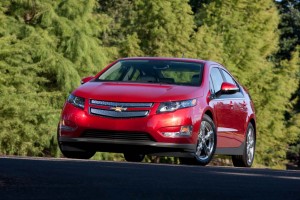
Looks like the Gen-2 Chevy Volt may come with some upgrades, including a longer electric-only range.
The Chevrolet Volt was intended to revolutionize automotive transportation and while there are plenty of critics who fault its high price and relatively Spartan interior there’s little doubt the extended-range electric vehicle has helped usher in a new era of battery-powered propulsion.
Even before they launched the Volt, however, General Motors officials were stressing that, in tech terms, there’d be a lot of things to improve on the “Gen-1” model, especially the limitations of its battery technology. Pointing to the future, they promised lower costs, as well as smaller and more powerful batteries.
A series of comments and reports in recent days seem to suggest that GM is getting ready to offer some big improvements as it prepares Chevy Volt Gen-2, with longer range and a new range-extending motor among the changes apparently in the works.
According to a Bloomberg interview with GM CEO Dan Akerson, there will be “some cost savings by virtue of the evolution of the [battery] technology.” Indeed, that already appears to have been the case with the 2014 version of the Volt, which will see its price tag trimmed by $5,000.
(For more on the Chevrolet Volt price cut, Click Here.)
When GM initially launched the Volt program, its lithium-ion batteries were estimated to cost as much as $1,000 per kilowatt-hour – or about $16,500 for a 16.5 kWh pack. That fell to about $700 by the time the plug-in hybrid got into production, according to various inside sources. And some observers believe that lithium technology can now be had for as little as $400 per kWh, with an industry-wide goal of dropping that to just $200 by decade’s end.
Former Volt program manager Tony Posawatz, who later took on the CEO job at ill-fated Fisker Automotive, told TheDetroitBureau.com that at $200, a battery-based drivetrain would be reasonably cost-competitive with a conventional gas powertrain.
Meanwhile, Chevy is apparently thinking about upping the range of the Volt, according to Akerson. That could be done even with the current model. A very cautious GM only uses about 60% of the energy the lithium-ion pack can hold, a move meant to ensure battery life. But competitors, with such models as Nissan Leaf and Tesla Model S, are using as much as 90% or more of their battery capacity – apparently to no ill effect.
(Click Here to read about Smart’s plans to slash price on electric model.)
If GM were to adopt a similar strategy, even the current battery could yield significantly more than the current 38-mile electric-only range. In his interview, Akerson hinted at a “significant” increase for Gen-2, which he then defined as “50 to 60 miles, or more.”
Chevrolet has promoted the Volt for its ability to continue driving even when its battery is drained, unlike a conventional electric vehicle. This “range-extending” capability is due to the paired use of a small, four-cylinder internal combustion engine.
But the maker is reportedly looking at alternatives to that current gas engine. Reports in several automotive media outlets, including Automotive News and Motor Trend contend the next Chevrolet Volt will get a 1.0- or 1.2-liter Opel 3-cylinder engine. The more efficient powertrain would deliver significantly better mileage in hybrid or gas-only mode.
But the engine, sourced from GM’s European arm Opel, would also bump up power by more than a third, to around 115 horsepower and 122 pound-feet of torque. That would add a bit more performance to the Volt, as well.
If all the reports prove accurate, then, the next-generation Volt would be quicker, longer-range and less expensive. It would also get a more stylish interior that could help it draw in more mainstream buyers.

Looks like some dealers are back at 19th century “dealer greed,” and are asking serious premium money for this “exploder.”
Now, if they would use the 1.2 turbodiesel that is a favorite in the smaller Opel models in europe, you could fill up the Volt every year on your birthday (to make the trip to Grandma’s, you know) and it would last you the rest of the year.
The $5,000 price drop was a desperation move to get consumers to start accepting impractical EVs so that the auto makers can pay lower fines for not being able to meet the absurd 54.5 mpg CAFE standards that will be taken effect soon.